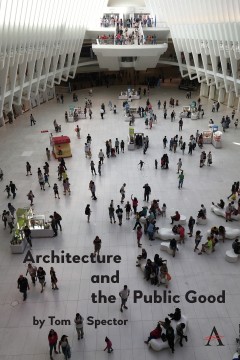Architecture and the Public Good
By Tom Spector
- About This Book
- Reviews
- Author Information
- Series
- Table of Contents
- Links
- Podcasts
About This Book
The practice of architecture as a learned profession is a fairly recent invention in the history of architecture, one that was an uneasy fit with professional ideals from its inception in the nineteenth century, and the value of which is under assault today from globalizing economic forces. Unfortunately, the profession’s longstanding internal tensions have prevented it from articulating a durable ethical rationale for its protections that would help it stand up to those assaults. This book proposes crafting just such a durable ethical rationale through the public good the architecture profession serves.
But the concept of the public is itself a recent historic phenomenon, one also experiencing both tremendous pressures and instability from many of the same sources destabilizing the architecture profession—globalization, neo-liberal economics, the rise of individualism, and the destruction of privacy. Therefore, to bring architecture and the public good together in any sustained way, both architecture’s instabilities and the public’s must be better understood. The book accomplishes this task by addressing the profession’s long-standing internal struggles that prevent it from articulating a strong ethical defense, the recent economic forces which are dispersing the profession’s center much as they have the world’s middle classes, the Enlightenment-derived concept of the bourgeois public and its more recent decline and reinvention, the importance of dissecting the shifting boundaries between the public and private realms, and finally a new approach to reassert the many ways in which architecture can not only serve the public good, but also become a protagonist in its renewal as a guiding ideal for our times.
Reviews
“Tom Spector combines an insider’s seasoned perspective on practice with the academic’s critical insight. Skillfully navigating among philosophy, economics and professional concerns, he is unflinchingly forthright on architecture’s internal shortcomings. This provocative diagnosis identifies opportunities for change and asserts a clearer claim for the ethical public value of our work.” — Graham Owen, Associate Professor, Tulane University, Editor, Architecture, Ethics and Globalization
“Since The Ethical Architect of 2001 Spector has emerged as amongst the foremost thinkers about the multiple moral dilemmas facing the architectural profession. This book, raising important philosophical issues for all students of the subject, in the eloquent and masterly way to which we have become accustomed, deserves the widest readership.” — Nicholas Ray, Emeritus Reader in Architecture, University of Cambridge, Emeritus Fellow, Jesus College, Cambridge and Visiting Professor, University of Liverpool School of Architecture
“Tackling some perennial paradoxes of the architecture profession, Tom Spector excavates the field’s ingrained assumptions about class, patriarchy, and power. By countering the status quos of neoliberal architectural practice, he asserts new performance specifications for the profession founded on principled and sustained commitment to a revivified public realm. —George Barnett Johnston, Professor, Georgia Institute of Technology
Author Information
Tom Spector is emeritus Professor of Architecture at Oklahoma State University and an internationally-acknowledged leader in the ethics of architecture and in architectural writing.
Series
Table of Contents
List of Figures; Acknowledgments; 1. The Architecture Profession and the Public Good; 2. The Architecture Profession in Capitalism; 3. Who Is the Public?; 4. Public and Private; 5. Toward an Architecture of Publicness; Appendix; Notes; Bibliography; Index.
Links
Stay Updated
Information
Latest Tweets



